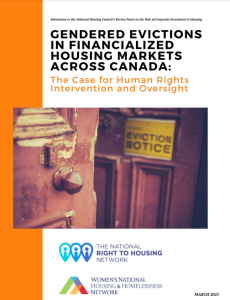 Background
Background
The housing crisis in Canada, particularly for women and gender-diverse people, is a two-fold challenge underpinned by the increased financialization of housing (defined here) and deepening poverty for those on low incomes or social assistance. As a result, we are increasingly seeing evictions in our communities.
Meanwhile, Canada’s recently adopted National Housing Strategy Act of 2019 established housing as a human right in domestic legislation. Drawing from international human rights law, this commitment means that all levels of government must progressively and expediently ensure non-discrimination and equality for women and gender-diverse people across Canada’s housing systems.
In this context of financialized housing markets and a legislated right to housing, our research considers human rights standards and asks: what does it mean for women, girls, and gender-diverse people to face an eviction—an experience compounded by the feminization of poverty and gender-based exclusion from labour markets, as well as other kinds of marginalization and discrimination?
Our Submission to the National Housing Council’s Review Panel
Our report and submission, produced in collaboration with the Women’s National Housing and Homelessness Network, aims to feed into Canada’s first-ever review panel (which reviews systemic violations of the right to adequate housing) and explores the intersection of financialization and evictions in the lives of women and gender-diverse people.
We urge the review panel to consider the gendered intersection of these issues across Canada, and to provide an assessment of, and suggested remedy for, the role that the financialization of housing plays in the denial of substantive equality for marginalized women and gender-diverse people.
Our report draws on data from our primary research, an extensive literature review, case law review, and testimony shared by our lived expert peers and colleagues, to identify four systemic issues which warrant priority attention:
- Evictions, gender-based violence, and the right to life
- Financialization and gender-based economic marginalization
- Gender-based barriers to access to justice
- Gaps in data, monitoring, and accountability
Our Submission to the House of Commons Standing Committee on Human Resources, Skills and Social Development and the Status of Persons with Disabilities (HUMA)
The HUMA Committee studies and reports on matters of legislation, policy, and programs to the House of Commons. In collaboration with the Women’s National Housing and Homelessness Network, we also made a submission to their study on the financialization of housing in Canada.
This HUMA study aims to examine corporate ownership of single family homes, rent gouging, and other predatory tactics related to financialization, like renovictions. The Committee will then report its findings to the House of Commons, where a comprehensive response from the Government must be tabled.
In our 5-page submission, we offer a brief summary of our research on gendered evictions in financialized housing markets, alongside a list of recommendations.

